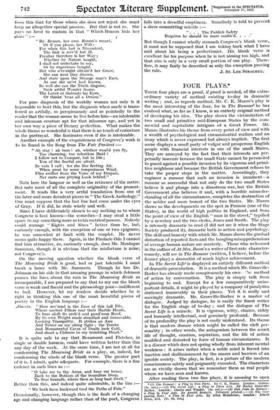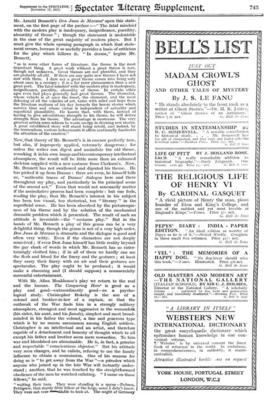FOUR PLAYS.*
THESE four plays are a proof, if proof is needed, of the extra- ordinary variety of method existing to-day in dramatic
writing ; and, as regards method, Mr. C. K. Munro's play is
the most interesting of the four, for in The Rumourl he has evolved what, as far as I know, is an entirely original method
of developing his idea. The play shows the victimization of two small and primitive mid-European States by the com- mercial and capitalistic intrigues of a Great Power. Mr.
Munro illustrates his theme from every point of view and with a wealth of psychological and circumstantial realism and an irony which is never expressed but always implicit. The first
scene displays a small party of vulgar and prosperous English people with financial interests in one of the small States. They are annoyed by the fact that their interests are per- petually insecure because the small State cannot be persuaded to guard against a possible invasion by its vigorous and primi- tive neighbour and because the British Government refuses to take the proper steps in the matter. Accordingly, they engineer a rumour that such an invasion is imminent—a rumour so successful that not only do the two small States believe it and plunge into a disastrous war, but the British Government also believes it and, with a horrible misunder- standing of all the circumstances, completes the destruction of the nobler and more honest of the two States. Mr. Munro shows us the developments on the spot in Przimia (one of the States), in the world of high politics in England, and from the point of view of the English "man in the street," typified by a newsboy and the two clerks, Jones and Smith. The play is intensely dramatic to read (I did not sec it when the Stage Society produced it), dramatic both in action and psychology. The skill and honesty with which Mr. Munro shows the gradual distortion of reported facts and the bungling misapprehensions of average human nature are masterly. Those who welcomed in the author of At Mrs. Beam's a writer of first-rate character- comedy, will see in The Rumour (written, I believe, before the former play) a dramatist of much higher achievement.
In The Secret Life' is displayed an entirely different method of dramatic presentation. It is a method which Mr. Granville- Barker has already made conspicuously his own— 'he method of action by conversation. The play is simply talk from beginning to end. Except for a few comparatively unim- portant details, it might be played by a company of paralytics stationed immovably in their places. Yet it is really and movingly dramatic. Mr. Granville-Barker is a master of dialogue. Judged by dialogue, he is easily the finest writer for the English stage of to-day ; and the dialogue of The Secret Life is a miracle. It is vigorous, witty, elusive, richly and humanly intellectual, and genuinely profound. Because of its profundity the play is not easily understood. Its theme is that modern disease which might be called the cleft per- sonality; in other words, the antagonism between the secret life of thought, emotion, aspiration, and the life of action modified and distorted by force of human circumstances. It is a disease which does not spring wholly from inherent mental weakness : it arises rather when a noble mind is forced into inaction and disillusionment by the snares and barriers of an ignoble society. The play, in fact, is a picture of the modern consciousness subtly and poignantly executed. The characters are so vividly drawn that we remember them as real people whom we have seen and known.
After reading these two fine plays, it is amusing to open
• (1) The Rumour : a Play in Two Parts. By C. 1i. Munro. London : [5s. net.]—(2) The Secret Life: a Play in Three Ada. Harley Granville- Barker. London: Matto and Winclus. [6s. net.]—(3) Don Juan de marana : a Play in Pour Ads. By _Arnold Bennett. Privately printed. (4) The Con- quering Hero: a Play in Four Ads, By Allan hionkhouse, Landon: Ernest Bean, Ltd, pm. Gd. net.; Mr. Arnold Bennett's Don Juan de Mammas upon this state- ment, on the first page of the preface :—" The fatal mischief with the modern play is inadequacy, insignificance, puerility, absurdity of theme " ; though the statement is undeniable in the case of the great majority of modern plays. But I must give the whole opening paragraph in which that state- ment occurs, because it so usefully provides a basis of criticism for the play which follows it. "In drama," begins Mr. Bennett, "as in some other forms of literature, the theme is the most important thing. A great work without a great theme is rare, though not unknown. Great themes are not plentiful, and they are probably all old. If there are any quite new themes I have not met with them. I dare say a great theme comes into being only about once in a century ; it is a far rarer phenomenon than a new great poet. The fatal mischief with the modem play is inadequacy, insignificance, puerility, absurdity of theme. In certain other ages even bad plays generally had great themes. The dramatist, whose vehicle is at once the finest, the clumsiest, and the most debasing of all the vehicles of art, turns with relief and hope from the frivolous realisms of his day towards the heroic stories which survive time and whose virtue is independent of actuality and superficial plausibility. He knows that, with them, instead of having to give adventitious strength to his theme, he will derive strength from his theme. The advantage is enormous. The very greatest artists seem seldom to waste energy in devising new stories. A great established story will stand being retold, and indeed, by the tremendous, various inducements it offers continually fascinates the attention of the creative."
Now, that theory of Mr. Bennett's is in essence perfectly true, but also, if improperly applied, extremely dangerous : for unless the writer can digest and assimilate the old theme, remaking it in his own image and his contemporary intellectual atmosphere, the result will be little more than an exhumed skeleton supplied with a new costume from Clarkson's. Now, Mr. Bennett has not swallowed and digested his theme. He has picked it up from Dumas : there are even, he himself tells us, "authentic traces of Dumas' dialogue here and there throughout my play, and particularly in the principal scene of the second act." Even that would not necessarily matter if the assimilative process had been complete : but one feels, reading the play, that Mr. Bennett's interest in his subject has been too visual, too rhetorical, too " literary " in the superficial sense. He has been absorbed by the picturesque- ness of his theme and by the solution of the mechanical dramatic problem which it presented. The result of such an attitude is invariable—the "costume play." But in the
hands of Mr. Bennett a play of this genus can be a very delightful thing, though the genus is not of a very high order.
Don Juan de Marana is dramatic and the dialogue is good and often very witty. Even if the characters are not deeply conceived ; if even Don Juan himself has little reality beyond the gay cloak of words in which Mr. Bennett has so enter- tainingly clothed him ; if in all of them we hardly can see the flesh and blood for the finery and the gestures ; at least they carry their finery with an air and their gestures are spectacular. The play ought to be produced ; it would make a charming and (I should suppose) a corrumercially successful entertainment.
With Mr. Allan Monkhouse's play we return to the real and the human. The Conquering Hero' is good as a play and good—extraordinarily good—as a psycho- logical study. Christopher Rokeby is the son of a colonel and brother-in-law of a captain, so that the outbreak of the War finds him in a strongly military atmosphere, strongest and most aggressive in the womenfolk (his sister, his aunt, and his fiancée), simplest and most broad- minded in his father the colonel, a fine and generous type which is by no means uncommon among English soldiers. Christopher is an intellectual and an artist, and therefore capable of a detachment and honesty of thought which to all except his father and brother seem mere cowardice. To him war and bloodshed are abominable. He is, in fact, a genuine and respectable " conscientious objector." But his attitude very soon changes, and he enlists, refusing to use the family influence to obtain a commission. One of his reasons for doing so is "to get away from the War "—a paradox which anyone who joined up in the late War will instantly under- stand ; another, that he was touched by the straightforward obedience of the men he watched enlisting. "I came on those fellows," he said, "waiting their turn. They were standing in a queue—Dobson, Pettigrew, that sturdy little fellow at the forge, some I didn't know. They were not verir-Rammaidable to look at. The might of Germany wouldn't think much of them. Dakin fell in at the back, and that —somehow—affected me. They all looked so humble and faithful. They seemed to be gazing at something a long way off and not thinking of themselves at all. And then it came upon me that there had never been anything in the world like this, that in all my life nothing had ever mattered so much, that I should never be happy again if I hela back now."
He returns from France broken by his experiences, and we
are shown, with remarkable insight and truth, the conflict between the humane, unrevengeful, and jealously personal attitude of the man who has fought, and the blood-thirsty, mock-heroic chauvinism of many stay-at-homes. Nowhere have I seen the intelligent fighting-man's attitude so pene- tratingly presented. Christopher held that attitude even before he went out. It is apparent when news comes that his sister Margaret's husband has died of wounds :—
" MARGARET (to Chris): You shall avenge him. CHRIS (breaking from her): No, no, no. How can you say that ? HELEN: Come, Margaret.
LADY HOMER: Come, my dear.
MARGARET: Avenge him ! Avenge him, Chris !
Onus: How can you talk these abominable stupidities now ? HELEN: Hush ! Hush !
CHRIS: Follow him, die with him, if you like. What has revenge got to do with him ? Ah ! It's a great thing, this war. It's taken Frank."
There is a foolish pretence at present that the War should be taboo for literature and art. On the contrary, it is vitally important (and, in any case, it is inevitable) that the War and its effects should be recorded by those who knew it. It is inevitable, because no artist can fail to react, even if indirectly, to so profound and soul-shaking an experience ; and it is important, because a new generation is already here who know the War only by hearsay, • and hearsay is inclined to convert grim reality into the heroic and picturesque. But it is the inevitability of the theme and not its importance from the social aspect that causes it to appear in artistic form, for to art propaganda is never anything more than a by-product.
MARTIN ARMSTRONG.




























































 Previous page
Previous page